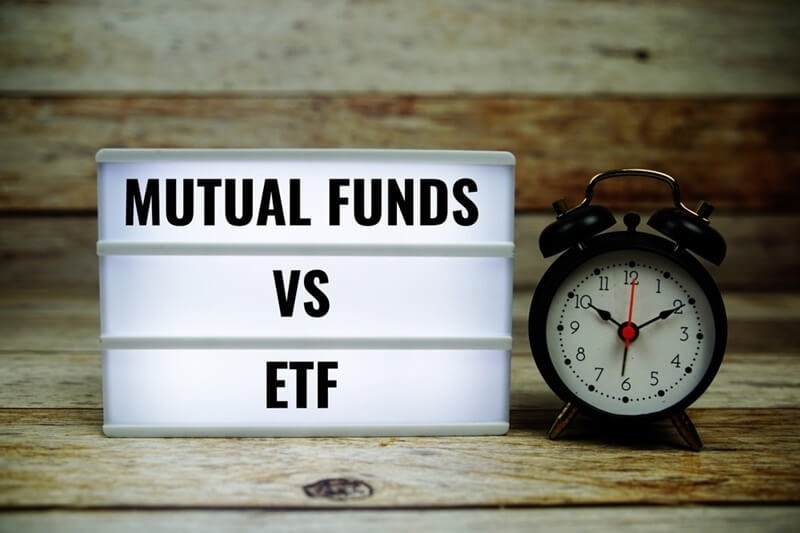
American investors are increasingly looking for smarter ways to build wealth, and two of the current favorites are exchange-traded funds (ETFs) and mutual funds. On the surface, they both appear identical, but the more you look at them, the greater the disparities can make an enormous difference to your pursuit. If you ever wondered how to compare mutual funds and ETFs and low-cost investment options, this guide puts it in plain language so that you can align your investments with your goals.
Both ETFs and mutual funds pool money from many investors to buy a diversified group of assets such as stocks, bonds, or commodities. It saves time for those who don't want to choose hundreds of securities on their own. But the mutual funds vs ETFs decision is more than a matter of style—it can affect your tax efficiency, fees, liquidity, and long-term performance.
As the U.S. investing environment continues to trend towards low-cost investing, it is not surprising that investors, both seasoned veterans and flat-out beginners, want assurance as to what avenue best suits their financial goals.
Mutual funds are baskets of securities managed professionally. If you buy a share in a mutual fund, you're essentially buying all of the securities in the fund. Your share is worth a certain amount once a day at the fund's "net asset value" (NAV), as determined after business closes.
Mutual funds come in two broad categories:
Actively managed funds: An actively managed fund manager deliberately selects which securities to purchase or sell in an attempt to beat the market.
Index mutual funds: They mirror a benchmark index, such as the S&P 500, and typically have lower fees.
Mutual funds have been the sweetheart of retirement accounts such as 401(k)s and IRAs for decades. They're utilized as much today due to the fact that they make it easy to diversify and enable investors to rely upon professional management.

ETFs (exchange-traded funds) are the same as mutual funds but operate differently. They are traded on the stock exchanges like stocks, so you can sell or buy shares of ETF within the trading day. They settle in real time, while mutual funds settle once daily.
ETFs are generally passively managed to track indexes, sectors, or commodities. Their popularity arises because they are transparent, liquid, and often less expensive in fees. For simple investing for newcomers, ETFs generally provide an easy starting point to the market.
When we compare mutual funds and ETFs, the following are the differences:
| Category | Mutual Funds | ETFs |
| Trading Flexibility | Quoted daily at NAV. No intraday buying or selling. | Traded on a stock-like basis, with intraday trading. |
| Fees | Variable expense ratios are higher for actively managed funds. Some have sales loads. | Typically, lower expense ratios, many of which are promoted as low-cost investments. |
| Tax Efficiency | When managers are required to sell securities, it generates capital gains distributions, which compel investors to pay tax burdens. | Generally, it is more tax-efficient because of the "in-kind" creation and redemption method. |
| Accessibility | Sometimes include minimum buys (e.g., $1,000–$3,000). | It can be bought for the price of one share, with some brokers providing fractional shares. |
| Management Style | Most likely to be actively managed. | Both passively managed and actively managed ETFs are gaining popularity. |
These are the key factors in deciding between ETFs and mutual funds, and your requirements may be best served by one or the other.
As a closing point before a decision is made, it is helpful to consider the advantages and disadvantages of ETFs:
| Advantages | Disadvantages |
| Lower costs than the majority of unit trusts. | Too much buying and selling can drive up trading costs. |
| Day-trading liquidity offers freedom. | Prices fluctuate on a day-to-day basis, causing overtrading. |
| More tax-efficient. | Niche ETFs are riskier as they focus on one industry. |
| Greater transparency of holdings—most ETFs disclose holdings on a daily basis. |
Based on evaluating the pros and cons of ETFs by comparison, investors can make a decision about whether this vehicle is best suited to their flexibility and affordability needs.
While ETFs are gaining popularity, mutual funds are still a draw. Let's examine their advantages and disadvantages:
Pros:
Cons:
You should be aware of these trade-offs when considering mutual funds versus ETFs in your portfolio.
If you're a new investor, the decision between mutual funds and ETFs may seem overwhelming. Fear not – both can be excellent together as part of beginner portfolio strategies.
Be simple: Simply use a broad-market S&P 500 index fund or ETF. You'll have diversification right away.
Think long-term: Either if you are doing mutual funds or ETFs, don't buy more frequently than quarterly or annually, and focus on compounding returns over decades.
Mix types: Some employ a combination of mutual funds in retirement accounts and ETFs in taxable brokerage accounts to get the best of cost, tax efficiency, and liquidity.
Automatic investing: Mutual funds typically facilitate automatic contributions and therefore, are ideal for disciplined savings. ETFs can do the same via brokerage auto-investment programs.
While creating starter portfolio plans, simplicity and periodicity are more important than keeping up with hot topics.
For beginners, the first step is to embrace simple investing. You don't need to be a financial market specialist to start. Here is a guide made easy:
Set goals: Are you saving money for retirement, a house, or a child's education? Your goals will decide your mutual fund vs. ETF selection.
Determine risk tolerance: Younger investors may be comfortable with equity-weighted portfolios, whereas investors nearing retirement may prefer more bonds.
Put costs first: Fees and commissions can consume returns over decades. ETFs are typically ideal for low-cost investment options, but a few index mutual funds are competitive, too.
Remain disciplined: Invest regularly and refrain from panicking and selling when the market is falling.
By focusing on simple investing for beginners, you lay the foundation that will grow with your money education.
Mutual funds vs ETFs is actually a question of what you require:
Ultimately, when you pit mutual funds against ETFs, there is no "winner" of the game. It's just whatever suits your investment objective, time horizon, and level of comfort with investing.
Mutual funds and ETFs will presumably form the backbone of investors' portfolios as a majority of Americans focus on autonomy and retirement preparedness through finances. The trend is toward ETFs, however, based on their asset size under management, ease of accessibility, and alignment with the search for low-cost investments.
But mutual funds are not going away anytime soon, particularly with their hegemony in employer-sponsored pension plans. To start with, the goal is not to be locked into the decision. Being early is more critical than making perfectly.
You don't have to make it difficult to compare mutual funds vs ETFs. Both offer diversification potential, professional management, and long-term appreciation. As you carefully consider the pros and cons of ETFs and mutual funds, look at fees, and examine your goals, you can make a well-educated decision.
For new investors, lean into starting investing. Focus on low-cost investment products, automate wherever you can, and prioritize consistency over trying to time the market. As time passes, your wealth will build, and you can apply your starting investor strategies to create a tailored investment plan.
At the end of the day, the wisest choice is not whether to crown a winner of the war between ETFs and mutual funds—it's which path best guides you toward a consistent bound for your own economic future.
This content was created by AI